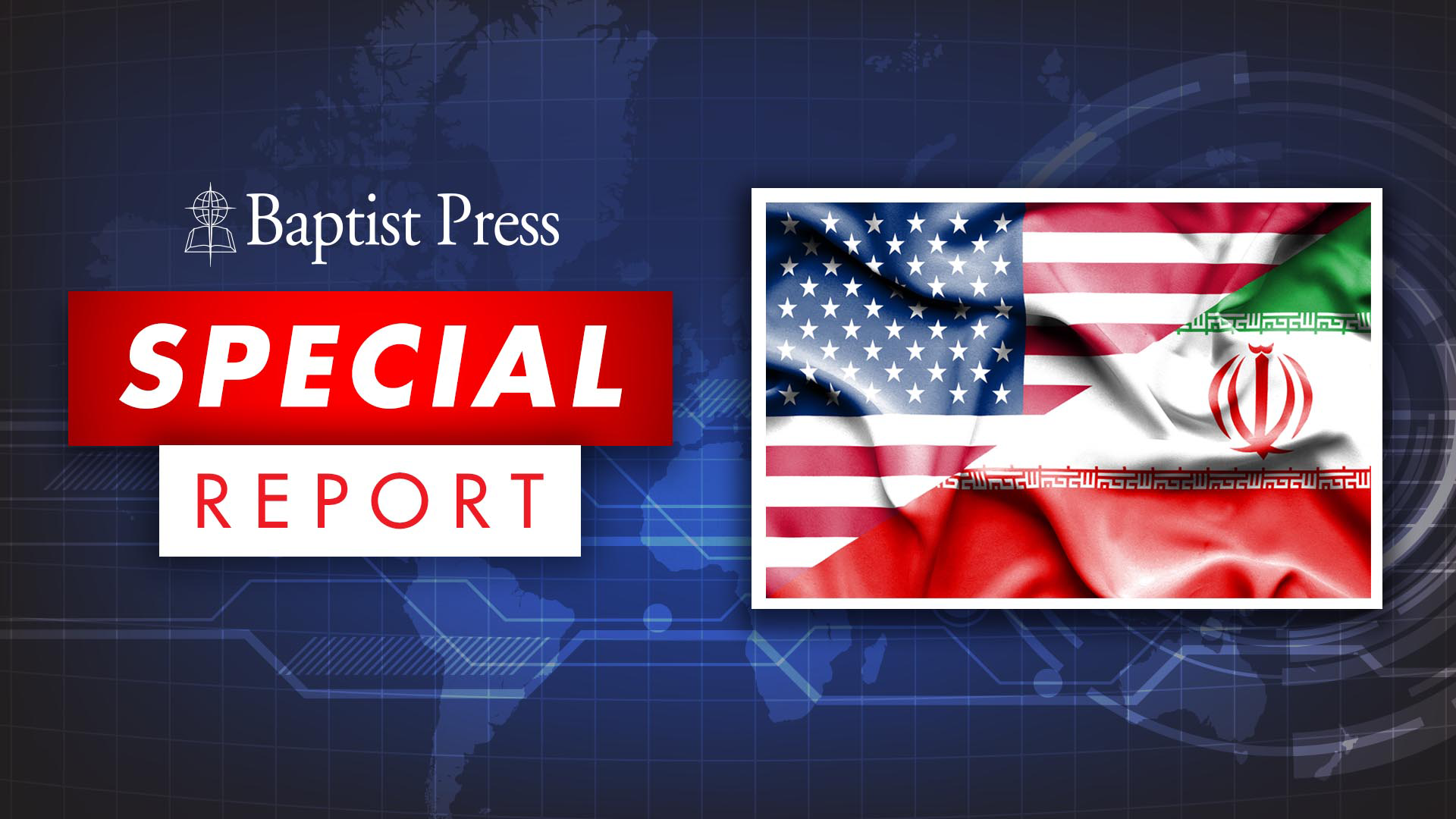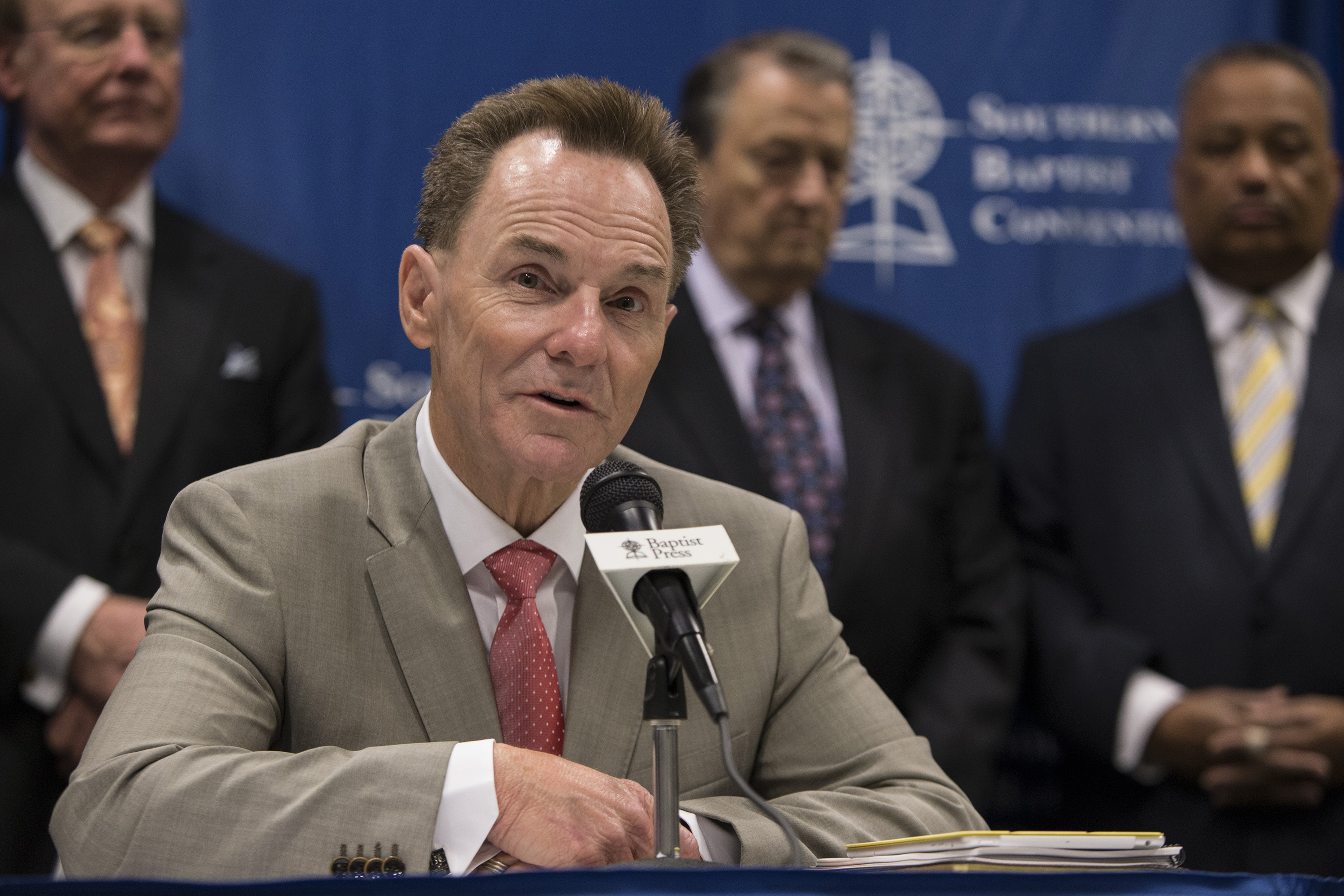
WASHINGTON (BP) — Evangelicals may differ about the best response to Iran’s Jan. 8 missile attack against military bases in Iraq housing U.S. troops, but they seem united in acknowledging the gravity of the situation and calling for prayer.
 America confronts “a sober moment in history as we face possible armed conflict against Iran,” said Douglas Carver, former chief of chaplains for the U.S. Army, noting that a military response “has always been America’s last resort.”
America confronts “a sober moment in history as we face possible armed conflict against Iran,” said Douglas Carver, former chief of chaplains for the U.S. Army, noting that a military response “has always been America’s last resort.”
Carver, the North American Mission Board’s executive director of chaplaincy, called Christians to “pray for the president and his advisers as they weigh the serious risk of taking retaliatory military action, or in taking no action at all in order to deter an escalation of aggression.”
The early-morning attacks included 22 Iranian missiles fired at two military bases in Iraq that housed American and Iraqi troops, The New York Times reported. No U.S. or Iraqi casualties were reported at either base, with damage apparently limited to infrastructure.
The “limited nature of the strike,” The Wall Street Journal wrote, may signal that Iran “wanted to respond to the targeted killing of its top military commander, Maj. Gen. Qassem Soleimani, without triggering American retaliation.”
Soleimani, head of the Islamic Revolutionary Guard’s elite Quds Force, was killed Jan. 3 in Baghdad by a U.S. military strike ordered by President Donald Trump. Over the past two decades, Soleimani allegedly coordinated thousands of killings in Iran and internationally, including attacks against U.S. troops in Iraq and Afghanistan.
In a White House address Jan. 8, President Trump appeared to deescalate the conflict. He defended his decision to eliminate Soleimani, reported “only minimal damage” at the two military bases and warned Iran to cease its “destabilizing” behavior in the Middle East. Trump announced new economic sanctions against Iran aimed at pressuring the Islamic nation to cease its nuclear weapons program and “end its support for terrorism.”
“We do not want to use” our military against Iran, Trump said. America seeks “to work together” with Iran on “shared priorities” and help Iran achieve “a great future” of “harmony with the nations of the world.”
Some observers have worried America could be on a path to war with Iran following Iran’s downing of U.S. drones, threats of military action, protests at the U.S. embassy in Iraq, the killing of a U.S. military contractor in Iraq last month by Iranian-backed militias and retaliatory U.S strikes in Iraq and Syria.
The buildup culminated with Soleimani’s death and Iran’s missile attack. Iran’s population of 83 million exceeds the combined populations of Iraq and Afghanistan, where American forces have been deployed for nearly 20 years, portending a difficult war should one ensue.
Southern Baptist ethicist Richard Land told Baptist Press Soleimani’s killing was morally justified in light of the powers given to governments in Romans 13. He expressed gratitude “for both the American soldiers’ sake and for the mullahs’ sake” that Iran’s retaliation “didn’t succeed in killing any Americans,” which would have provoked “significant consequences.”
U.S. officials now should talk with Iran, said Land, former president of the Ethics & Religious Liberty Commission (ERLC), with three objectives: for Iran to stop sponsoring terrorism, stop seeking to destroy Israel, and cease its nuclear weapons program.
Land hopes strength exhibited by the Trump administration in its action against Soleimani will cause Iran’s Islamic leaders to make “a new calculation” if they contemplate future attacks against Americans: “When you send out your foot soldiers to commit murder and mayhem and kill innocent men, women and children, it’s not your foot soldiers that are going to die. We’re going to kill you.”
Daniel Heimbach, a Southern Baptist ethics professor who advised President George H.W. Bush during the 1991 Persian Gulf War, said the complexity of America’s dealings with Iran underscore the need to pray that “God gives our leaders wisdom, patience, and self-control and restrains those stirring trouble.”
“We are contending with forces of irrational ideology that do not perceive their own self-interest in objective terms,” Heimbach, senior professor of Christian ethics at Southeastern Baptist Theological Seminary, said of Iran’s leaders. “So while U.S. actions may be morally justified, I do not know enough to assess whether what we are doing is optimal or another course of action could be better…. Miscalculating what we do can be incendiary.”
Religion News Service reported Jan. 3 that religious leaders seem to be “split along liberal and conservative lines” in their social media comments about the U.S.-Iran conflict, with liberals opposing the Trump administration’s actions and conservatives supporting it.
In June, a Political/Morning Consult poll found that evangelicals were more likely at that time to support military action against Iran than their non-evangelical counterparts. A full 51 percent of evangelicals supported military action against Iran following the downing of an unmanned U.S. drone over the Strait of Hormuz, compared with 35 percent of those considering themselves non-evangelicals.
Yet while some focus on Iran as a potential field for military conflict, others are more focused on Iran as a mission field and say the present conflict likely will not decrease a wide evangelistic opportunity currently available in the Muslim nation.
In the past 20 years, more people in Iran have come to faith in Christ than in the previous 1,300 years combined — the period since Islam first arrived, according to an article by Iranian-American pastor Afshin Ziafat posted at DesiringGod.org. Missiologists estimate there are between 300,000 and 1 million believers in Iran, up from just 500 known believers in 1979, when Iran’s current government came to power.
“Probably, the [Iranian] regime is hoping” Soleimani’s death “will galvanize the people towards their cause” because America supposedly has “attacked one of our people,” Ziafat, pastor of Providence Church in Frisco, Texas, told BP. “But I think in the long run, the people are going to remain discontented with the leadership” and “open to the Gospel.”
Amid all the political maneuverings, Christians must “see above all this and see that the opportunity right now is continuing to open more and more.”
The Southern Baptist Convention has mentioned Iran in resolutions twice in the past decade, on both occasions noting the nation’s persecution of Christians and calling for greater religious freedom. In 2014, the ERLC gave the Richard Land Distinguished Service Award to Iranian-American Naghmeh Abedini on behalf of her then-husband, Saeed, an American citizen imprisoned from 2012-2016 by Iran’s oppressive regime for his Christian service in that country.
ERLC President Russell Moore called Christians to prayer in a Jan. 8 statement.
“As we watch these events unfold, every Christian should be praying for the troops who are in harm’s way,” Moore said. “We should also be praying for President Trump, Secretary [of Defense Mark] Esper, and our military and intelligence leaders, that they would make wise and just decisions. At the same time, we should also remember our brothers and sisters in Christ in the persecuted church in Iran right now. We should pray for the day when Iran will finally be free from the tyranny of this despotic regime and the church and people of Iran can live their lives in peace.”


















